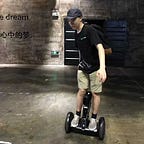Bit Brother is Watching You
How Technologies Could Become Tools for Authorities to Manipulate Society
A Book Review on George Orwell’s 1984
In George Orwell’s 1984, Winston describes a number of technological advancements that exist in the society he lives in. From telescreens to floating fortresses, Winston discusses their implications in a totalitarianism society, along with his personal experiences living with those technologies. In Orwell’s imagination, technologies have been developed as tools for authorities to manipulate society, with the ability to brainwash the entire population with false information on media, to surveil citizens through daily-devices to ensure its political dominance, and related research and productions are only allowed in Party’s interest.
Media technologies let authorities to implement reality control effectively and continuously brainwash their citizens to accept party’s political ideology. In Oceania, telescreens are installed in every Party member’s house. They can never be turned off, and they play political propagandas, military and production reports continuously. All news announced are fake records that the Ministry of Truth issues, but over time party members start to believe in it through the practice of doublethink and duckspeak. Ultimately, the massive up-to-date media let the party members become unaware of the real society, and rather blindly follow the ideal utopian world that the Party described. Without working in the Records Department, Winston, just like many others, would have put absolute trust on the media. Another example could be found in the versificators, which compose orthodox music without any human intervention. This technology reflects Party’s effort in diminishing humanity and replacing creativity with machines. Additionally, Orwell expressed fear for machines taking over creativity while humans would be labored to do simple repetitive works. A massive and efficient propaganda system with the aid of new technologies such as telescreens and the versificators, information could be altered in the current political interest and delivered quickly without being noticed, and thus influence the entire population and achieve Party’s goal of reality control.
In addition, widespread daily devices provide the government with constant surveillance on their citizens. Such example could be found as the telescreens being mandatorily installed everywhere, even at Party members’ houses, with cameras and microphones connected to the Thought Police and randomly being picked up; as well as microphones being secretly installed in rural areas. The first time that telescreens functioned and scared Winston was during a daily exercise. “6709 Smith W! Yes, you! Bend lower, please!” (Orwell 39). Winston was scared and realized the Party’s superior control over its citizens; the telescreens caught him for not paying enough attention to the exercise. With the constant surveillance around the Party’s member, “a nervous tic, an unconscious look of anxiety, a habit of muttering to yourself” (Orwell 65) could be interpreted to ThoughtCrime at any time. Winston and Julia were also captured because of the telescreens behind paintings in Mr. Charrington’s house. Telescreens have become the essential tool to provide direct evidence for the Thought Police, as well as creating a scary environment by declaring Party’s absolute control to stop anyone from having any unorthodox thoughts. It is the sense of randomly being surveilled that prevents any revolt against the party and ensures the execution of doublethink.
Another of Orwell’s fear was that scientific progressions and technological productions are only made for authorities’ political interests rather than market or humanity motivations. INGSOC operates on a totalitarian method that restricts goods to go into public to keep the balance of power and create the absolute authority, even the production methods are advanced enough for everyone to be equally wealthy. Such example could be found as the Floating Fortress, the gigantic construction that costs “the labour that would build several hundred cargo ships”(Orwell 199), but ultimately “scrapped as obsolete” and being built repeatedly. Moreover, every innovation, even the advanced speakwrite and versificator, are only made for political interests. Almost all scientific research had been stopped, the word “Science” no longer exists in Newspeak. The only continuing research is “how to discover, against his will, what another human being thinking” and “how to kill several hundred million people in a few seconds without giving warning beforehand.”(Orwell 201) Psychologists focus on detecting facial expressions and voice, and how to torture and make people confess most effectively; Physicists, chemists, biologists develop larger rocket bombs and deadlier gases. However, housing, infrastructures, healthcare, and food quality in Airstrip One has always been horrific, yet no research or initiative has been focused on those issues. This reveals Orwell’s fear that technological advancements would be too politically driven, and forbidden its purpose of serving humanity. To some extent, 1984 predicts the society of the Soviet Union in its last period, where citizens were starving and short of daily goods meanwhile the States devotes most resources on military research and productions.
Orwell’s imagination reveals the fear of technologies being a powerful tool for authorities to manipulate society, by brainwashing citizens, invading privacies and eliminate political enemies, and being restricted to develop only in political interests. In Winston’s world, the use of technologies had been betrayed its original purposes of serving human beings and rather became threats to humanity. Orwell alerts us the possible threat that technologies could bring, even applicable to today’s society: the fake news and general publics’ dependencies on social media, the popularity and backdoor on our daily digital devices, Artificial Intelligence’s trend of replacing the majority of workforce, and increasing expense on developing more devastating weapons. Totalitarianism is not visible; Rather, it hides under the painting of democracy, with all its tools surrounding us and traps us in the information web.
Works Cited
Orwell, George. 1984. N.p.: Penguin , 2008. Print.
